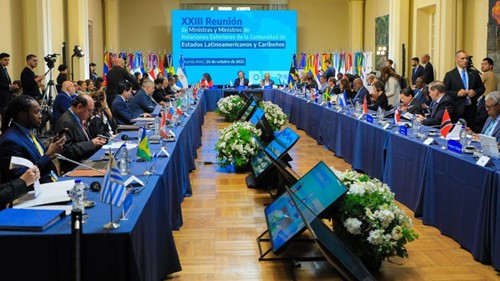
Representatives from 32 countries are in Argentina for the XXIII Meeting of Foreign Ministers of the Community of Latin American and Caribbean States (CELAC), during which they are expected to analyse the region’s current challenges.
According to a communiqué from the Argentine Foreign Ministry, the opening session took place at the San Martín Palace as part of the calendar of activities programmed and coordinated by Argentina, which holds the Presidency Pro Tempore (PPT) of CELAC.
At the meeting, the officials will discuss 15 lines of action established by the PPT of CELAC, which also include other topics for analysis: integration of Latin American and Caribbean infrastructure, environmental cooperation, and improvement of the situation and status of women in member countries.
The meeting of Latin American and Caribbean foreign ministers is taking place in a context in which the Argentine PPT is committed to institutionalising the bloc and making this regional mechanism a relevant actor in the international concert with an active role in the efforts to achieve a peaceful solution to the war in Ukraine and a secure supplier of energy and food on the basis of supportive multilateralism.
For the Argentine government, the participation of Latin American, Caribbean, and European foreign ministers who have already confirmed their presence at the summit “reinforces the relevance of the meeting as a sign of cooperation,” and stressed that its thematic agenda “represents the common priorities identified by the 59 countries that make up both regional blocs.”
Upon assuming the annual presidency of CELAC in January, Argentine President Alberto Fernández emphasised that the group was not created “to interfere in the political and economic life of any country,” but to promote “consensus and plurality within the framework of democratic coexistence without any kind of exclusion.”
“We are part of a great homeland that unites us, although many do their utmost to divide us and consequently easily subjugate us,” he said.
